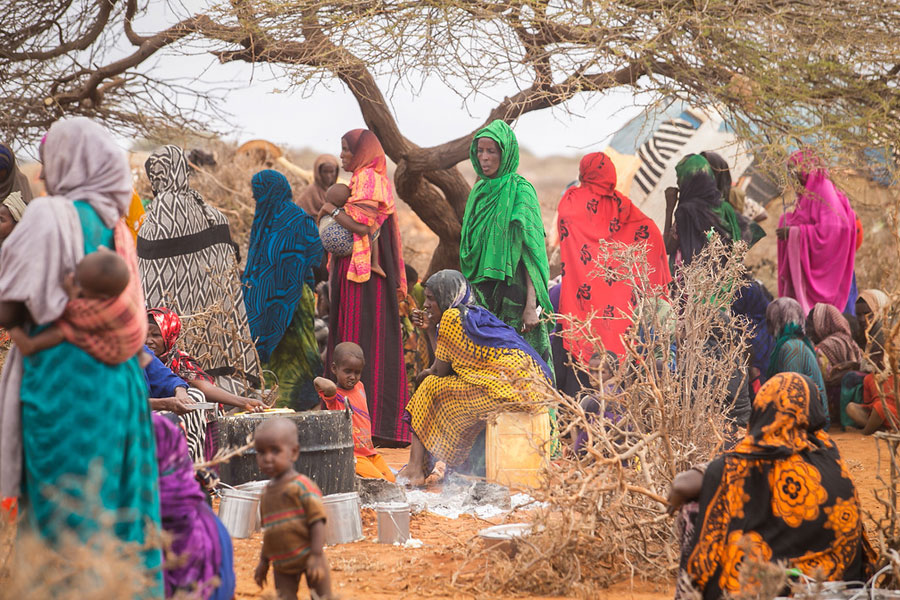
Fortune News | May 14,2022
The earliest childhood memory of Dawit Gezahegn, who is in his early 20s, is being in an orphanage. Adopted at a young age, he never knew who his biological parents were.
He was fortunate enough to grow up in a non-profit organisation working with street children, Italian Capriccio, located around Semen Hotel on Mali Street. Dawit grew up not worrying about food, shelter and education.
“Though my childhood was filled with anger and sadness that I didn’t have a family, my memories of the NGO are happy,” he says. “There were nine of us. It was a cheerful place.”
This did not last long, however. The NGO closed in the mid-2000s, the orphanage was turned into a hotel and Dawit was forced out onto the streets. In and out of temporary shelters ever since, he was once able to land a job with a monthly salary of 1,000 Br.
“With expenses for rent and food, I just couldn’t manage or change my life working at that job,” said Dawit.
Three years ago, he finally quit his job and became homeless. From addiction to going hungry, it was a terrible life. This changed last month.
A group of people came and approached him, asking if he would like to enter a rehabilitation centre.
“I was excited for the opportunity,” he says. “I took it as a sign the universe was giving me a second chance.”
He was taken to a temporary rehabilitation centre located on the premises of a former school, Finfine, near Estifanos Church. Dawit was one of 3,200 homeless people that joined rehabilitation centres across the city.
This was after the Addis Abeba City Administration established a trust fund to be used for the rehabilitation of the city’s street children. Initial seed money of 100 million Br was allocated for the project.
“The project was a result of the City’s Administration belief that recent reforms across the country should be backed by social changes as well,” said Endeshaw Abera, the Labor & Social Affairs Bureau's destitute rehabilitation director for the city.
490 street children and homeless individuals are currently sheltered in Finfine School, one of the eight temporary rehabilitation centres.
The Addis Abeba City Administration Social Trust Fund, a 9-member board chaired by President Sahle-Worq Zewde, was established with the mandate of administering the project.
The City Administration also planned to secure funding from multiple sources, including through public fundraising.
“The fund is allocated for the city’s destitute population, including the elderly and the disabled, not just street children,” said Endesahw.
The City Rehabilitation Bureau is mandated with gathering the street children and setting up the shelters. The population of the urban destitute across Ethiopia’s 11 major cities is estimated to be 88,690, 1.6pc of the total urban population. Roughly 50,000 of them live in Addis Abeba, according to a study conducted under the Urban Productive Safety Net Project in 2018.
The urban destitute described as people with an inability to meet their basic needs and who depend on the goodwill of others, according to the City Administration.
The largest age group is between 18 to 35 years of age, who account for more than 62pc of the urban destitute, while children account for less than 11pc.
The city planned to take in 5,000 individuals at a time into rehab centres. The work started on February 2, 2019, with 300 volunteers.
The children were taken to eight rehabilitation centres in converted government properties that were vacant. Seven are exclusively for men, since it is believed that there are many more homeless males than females. A rehabilitation centre in Lideta has been assigned to women.
At the rehabilitation centres, identification and classification were sorted out where the elderly and the disabled were moved to permanent institutions, like Makedonia. Those believed to have mental problems were moved into mental institutions.
Children below 15 without families are to be moved into government orphanages, while children that have families will be returned to them. For children above 15 who want to work, vocational training will be provided depending on their educational capacity.
Those who already have a certain level of training, about 11pc of the 3,200 that entered the program, are to be trained to hone their skills. There were 16 college degree holders and one who had a master’s degree.
490 street children and homeless individuals are currently sheltered in Finfine School, one of the eight temporary rehabilitation centres.
They were told they would stay at the rehabilitation centres for four to six weeks, and once they finish their training, that they will be assigned to jobs.
“From employment opportunities to temporary shelters, there were a lot of promises,” said Dawit.
Once settled, he was given two sets of clothes, a sheet, a blanket and a mattress. He was served three meals a day and shared a dormitory with 37 other street children.
But life in the centre moved slowly. It has been a month and a half since he joined the centre, but the programs he was promised have not materialised yet.
“The only training we took was for psychology,” he says. “It feels much more like a military camp.”
From the 540 that entered the rehabilitation centre in the former school, about nine percent have already left.
“The young ones find it difficult to cope with the change,” says Dawit. “Except for providing food and shelter, nothing is being done to help them come out of their addiction.”
Officials are blunt that there are indeed challenges. The primary challenge in administrating the centres is the structural and institutional framework.
“We face problems that require immediate solutions,” Desta Gulti, the main coordinator of the rehabilitation centre at the former school, says. “But with the current structure of the fund, we have to write letters to the City’s Labor Affairs Bureau and wait for answers as problems continue.”
He suggests that the program be outsourced to NGOs that have experience in the area, and for the government to stick to oversight.
Endashaw argues along the same vein, saying that rehabilitating the children is a slow and steady process. The current project we have embarked upon lacks both a legal framework and a precedent.
“If we get them a job, they will need to have an identification card, which they neither have nor can get,” he says. “We can’t approach the issue informally and designing the system is going to take time."
Almost two-thirds of the street children are from SNNP, Amhara and Oromia regional states.
“The current political problems of the country have made things more difficult,” said Endeshaw. “Only the Tigray Regional State has responded to the inquiries of the city to return the street children to their homes.”
NGOs are skeptical of the whole program, saying that it seems too short-sighted. Mickiyas Fekade, the founder of Hold My Hand, an NGO that has been working on the rehabilitation of street children for five years, is one of them. The NGO currently takes care of 32 children.
“The healing process requires the children to develop a strong personal connection with their caretakers,” said Mickiyas. “Creating a sense of family with centres like that is impossible.”
Bethlehem Damtew, an expert in the field of social work who has been working with street children for the past half decade, agrees with Mickiyas.
“For change to take place and to heal past problems or addictions, there needs to be a deep understanding of each of the children’s past and personal behaviors,” said Bethlehem.
This is a reflection of the declining optimism those that have joined institutions are showing compared to last month when they were brought in.
“I don’t expect much from the centre,” says Dawit. “If the streets have taught me anything, it is that I am on my own.”
PUBLISHED ON
Mar 23,2019 [ VOL
19 , NO
986]

Fortune News | May 14,2022

Radar | Jun 30,2024

Radar | Jun 03,2023

Radar | Sep 10,2023

Fortune News | Apr 03,2023

Dec 22 , 2024 . By TIZITA SHEWAFERAW
Charged with transforming colossal state-owned enterprises into modern and competitiv...

Aug 18 , 2024 . By AKSAH ITALO
Although predictable Yonas Zerihun's job in the ride-hailing service is not immune to...

Jul 28 , 2024 . By TIZITA SHEWAFERAW
Unhabitual, perhaps too many, Samuel Gebreyohannes, 38, used to occasionally enjoy a couple of beers at breakfast. However, he recently swit...

Jul 13 , 2024 . By AKSAH ITALO
Investors who rely on tractors, trucks, and field vehicles for commuting, transporting commodities, and f...

Oct 18 , 2025
The political establishment, notably the ruling party and its top brass, has become p...

Oct 11 , 2025
Ladislas Farago, a roving Associated Press (AP) correspondent, arrived in Ethiopia in...

Oct 4 , 2025
Eyob Tekalegn (PhD) had been in the Governor's chair for only weeks when, on Septembe...

Sep 27 , 2025
Four years into an experiment with “shock therapy” in education, the national moo...